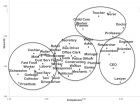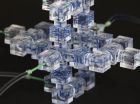(Press-News.org) ANN ARBOR, Mich. — A surprising new study pulls back the curtain on one of the most contentious issues in health care: differences in payment and income between physicians who perform operations, procedures or tests, and those who don't.
Contrary to perception, the research indicates, the physician payment system is not inherently "rigged" to favor surgeons and other procedure-performing doctors.
The new findings counter the widely held belief that a simple difference in pay per minute explains why doctors who perform procedures often earn nearly twice as much money in a year as those who provide care mostly in office visits.
Instead, it appears the difference has more to do with how long it takes doctors to provide whatever care they give – or rather, how long the influential Medicare payment system assumes it takes them. The results, compiled by a team based at the University of Michigan Medical School, are published in the Annals of Surgery.
Some have thought that because the panel that makes payment recommendations to the Medicare system includes mostly members of medical specialty societies, they allocate more dollars to the standard payments for their services.
But the team's exhaustive analysis of the Medicare Physician Fee Schedule finds that the rate surgeons are paid per minute while they perform surgery or a procedure is about the same as what primary care doctors or other "cognitive" physicians are paid per minute during a routine office visit.
Medicare's payment system includes codes for more than 6,000 types of physician work and the estimated times it takes doctors to perform each one. It has wider implications because it also influences the amounts private insurers pay.
The new analysis shows that the difference in pay between physicians arises mostly because of differences in the number of minutes that Medicare's formula assumes it takes doctors to do any particular operation, procedure or exam. The system is based on measurements called RVUs, for Relative Value Units. These RVUs are later directly converted to dollar amounts by Medicare using a separate formula.
Lead author Kevin Kerber, M.D., M.S., was surprised that nearly all of the differences in RVUs among the codes was explained by differences in the time estimates for the work. "This is a huge issue," says Kerber, "because we really need to understand our payment system before we can make effective changes that achieve desired outcomes." He is an associate professor in the U-M Department of Neurology and member of the U-M Institute for Healthcare Policy and Innovation.
"It is amazing to me how many people, including doctors, actually have no idea how payments per service are determined," he adds. "It is also amazing how many incorrect or ill-informed assumptions are out there about this issue. This is despite the fact that we are dealing with enormous amounts of money and that payment decisions can basically determine practice patterns. Doctors are human and thus susceptible to incentives."
The analysis did show that there are some outlier codes that paid substantially more or less per minute than average. But all are for types of services that aren't common, and therefore cannot explain large differences in income. On average, surgeons and procedure-performing doctors earn about $300,000 per year, compared with about $160,000 for primary care physicians.
"Our main interest in performing this work was not to identify outliers, but more simply to assess if the large differences in pay among specialties could be explained by differences in payment per time per service," Kerber says. "If that was true, then we would have had to assume that the groups who assign payments are giving more value to procedures and tests than to office visits. But, we did not find evidence to support that possibility, even after adjusting the analysis for the utilization of codes. What this means is that basically those who set RVU values for types of physician work are doing little more than assigning a standard RVU per minute amount to each and every service regardless of the type or specialty of the work."
The RVU values for each code are set by the federal Centers for Medicare and Medicaid Services, which takes input from the American Medical Association's Relative Value Scale Update Committee or RUC, which is made up of physicians from a wide range of specialties.
Kerber explains, "What this research shows is that the largest and most influential payer in healthcare – Medicare – and the panel of doctors that advises them – the RUC – are not overtly setting payment rates higher for surgeons and proceduralists than primary doctors." Yet, that still does not explain why proceduralists and surgeons earn much more money than primary doctors.
Kerber says that it remains possible that the times assigned to the codes may not be completely accurate. The time estimates are determined by surveys of physicians, which are subject to error.
If the times allocated to the RVUs are too short for office visits and too long for many surgeries and procedures, that would create actual differences in pay per minute, which would be much harder to identify. Another potential source for income difference could be in the additional payments that Medicare makes for the overhead costs involved in each service, such as tools and equipment. It is possible that these payments unintentionally create profit sources and incentives for procedures.
Other possibilities that could explain income differences are work hours or alternative income sources. The average proceduralist or surgeon works 5 percent to 10 percent more hours per week than the average primary care doctor. But the work hour difference doesn't even come close to explaining the magnitude of the differences in income. Proceduralists and surgeons could also have more non-patient care related income, such as income from administrative work or consulting.
Kerber notes that another reason that understanding physician payments is important is that medical students seriously consider future income in their career decision. "Some students will choose a high-income surgical specialty over primary or cognitive care, even if their passion is really with office-based work," he says. "That is a problem because our payment system is largely dis-incentivizing some of the most important careers in medicine."
INFORMATION:
The data for the study came from the CMS website, and the researchers did not have outside funding. In addition to Kerber, who advises the American Academy of Neurology on RVU issues, the authors are Marc Raphaelson, M.D., who also advises the AAN on RVU issues; Gregory Barkley, M.D., who serves as an alternate on the AAN committee, and U-M neurologist James F. Burke, M.D., M.S. Burke is also a member of IHPI.
Reference: Annals of Surgery, doi: 10.1097/SLA.0000000000000990
Think the system for paying US doctors is rigged to favor surgeons? Study may surprise you
2014-09-22
ELSE PRESS RELEASES FROM THIS DATE:
Scientists seen as competent but not trusted by Americans
2014-09-22
PRINCETON, N.J.—If scientists want the public to trust their research suggestions, they may want to appear a bit "warmer," according to a new review published by Princeton University's Woodrow Wilson School of Public and International Affairs.
The review, published in the Proceedings of the National Academy of Sciences (PNAS), shows that while Americans view scientists as competent, they are not entirely trusted. This may be because they are not perceived to be friendly or warm.
In particular, Americans seem wary of researchers seeking grant funding and do not trust ...
We drink more alcohol on gym days
2014-09-22
Thursdays to Sundays are when people both exercise more and drink more
Study used smartphones to record daily alcohol intake and physical activity
Findings differ from past research on physical activity and exercise
CHICAGO --- A new Northwestern Medicine® study finds that on days when people exercise more -- typically Thursdays to Sundays -- they drink more alcohol, too.
This is the only study to use smartphone technology and a daily diary approach for self-reporting physical activity and alcohol use.
"Monday through Wednesday people batten down the hatches ...
The fine line between breast cancer and normal tissues
2014-09-22
Boston, MA – Up to 40 percent of patients undergoing breast cancer surgery require additional operations because surgeons may fail to remove all the cancerous tissue in the initial operation. However, researchers at Brigham and Women's Hospital (BWH) have successfully tested a tool they developed that will help surgeons better distinguish cancerous breast tissue from normal tissue, thereby decreasing the chances for repeat operations.
The study is published online the week of September 22, 2014 in the Proceedings of the National Academy of Sciences.
The tool, known ...
Plant variants point the way to improved biofuel production
2014-09-22
Manufacturing biofuels from food crop by-products such as straw could be made quicker and cheaper thanks to the work of scientists in the UK and France.
Researchers funded by the Biotechnology and Biological Sciences Research Council (BBSRC) have discovered variant straw plants whose cell walls are more easily broken down to make biofuels, but which are not significantly smaller or weaker than regular plants.
The discovery could help ease pressure on global food security as biofuels from non-food crops become easier and cheaper to make.
The impact of carbon emissions ...
Study: Antifreeze proteins in Antarctic fishes prevent freezing…and melting
2014-09-22
CHAMPAIGN, Ill. — Antarctic fishes that manufacture their own "antifreeze" proteins to survive in the icy Southern Ocean also suffer an unfortunate side effect, researchers report: The protein-bound ice crystals that accumulate inside their bodies resist melting even when temperatures warm.
The finding is reported in the Proceedings of the National Academy of Sciences.
"We discovered what appears to be an undesirable consequence of the evolution of antifreeze proteins in Antarctic notothenioid fishes," said University of Oregon doctoral student Paul Cziko, who led ...
Healthy lifestyle choices may dramatically reduce risk of heart attack in men
2014-09-22
WASHINGTON (Sept. 22, 2014) — Following a healthy lifestyle, including maintaining a healthy weight and diet, exercise, not smoking and moderating alcohol intake, could prevent four out of five coronary events in men, according to a new study publishing today in the Journal of the American College of Cardiology.
While mortality from heart disease has declined in recent decades, with much of the reduction attributed to medical therapies, the authors said prevention through a healthy lifestyle avoids potential side effects of medication and is more cost effective for population-wide ...
Immune response turned up, not down, by flu during pregnancy, Stanford/Packard study finds
2014-09-22
Pregnant women have an unusually strong immune response to influenza, an unexpected finding that may explain why they get sicker from the flu than other healthy adults, new research from the Stanford University School of Medicine and Lucile Packard Children's Hospital Stanford has found.
The results were surprising because immune responses are thought to be weakened by pregnancy to prevent the woman's body from rejecting her fetus.
The study, which will be published online Sept. 22 in the Proceedings of the National Academy of Sciences, is the first to examine the ...
Firelight talk of the Kalahari Bushmen
2014-09-22
SALT LAKE CITY, Sept. 22, 2014 – After human ancestors controlled fire 400,000 to 1 million years ago, flames not only let them cook food and fend off predators, but also extended their day.
A University of Utah study of Africa's Kalahari Bushmen suggests that stories told over firelight helped human culture and thought evolve by reinforcing social traditions, promoting harmony and equality, and sparking the imagination to envision a broad sense of community, both with distant people and the spirit world.
Researchers previously studied how cooking affected diets and ...
University of Utah engineers unlock potential for faster computing
2014-09-22
SALT LAKE CITY, Sept. 22, 2014 – University of Utah engineers discovered a way to create a special material – a metal layer on top of a silicon semiconductor – that could lead to cost-effective, superfast computers that perform lightning-fast calculations but don't overheat.
This new "topological insulator" behaves like an insulator on the inside but conducts electricity on the outside and may pave the way for quantum computers and fast spintronic devices.
The research, led by University of Utah materials science and engineering professor Feng Liu, was published today ...
Lego-like modular components make building 3-D 'labs-on-a-chip' a snap
2014-09-22
Thanks to new LEGO®-like components developed by researchers at the USC Viterbi School of Engineering, it is now possible to build a 3-D microfluidic system quickly and cheaply by simply snapping together small modules by hand.
Microfluidic systems are used in many fields including engineering, chemistry and biotechnology to precisely manipulate small volumes of fluids for use in applications such as enzymatic or DNA analysis, pathogen detection, clinical diagnostic testing, and synthetic chemistry. Traditionally, microfluidic devices are built in a cleanroom on a two-dimensional ...




